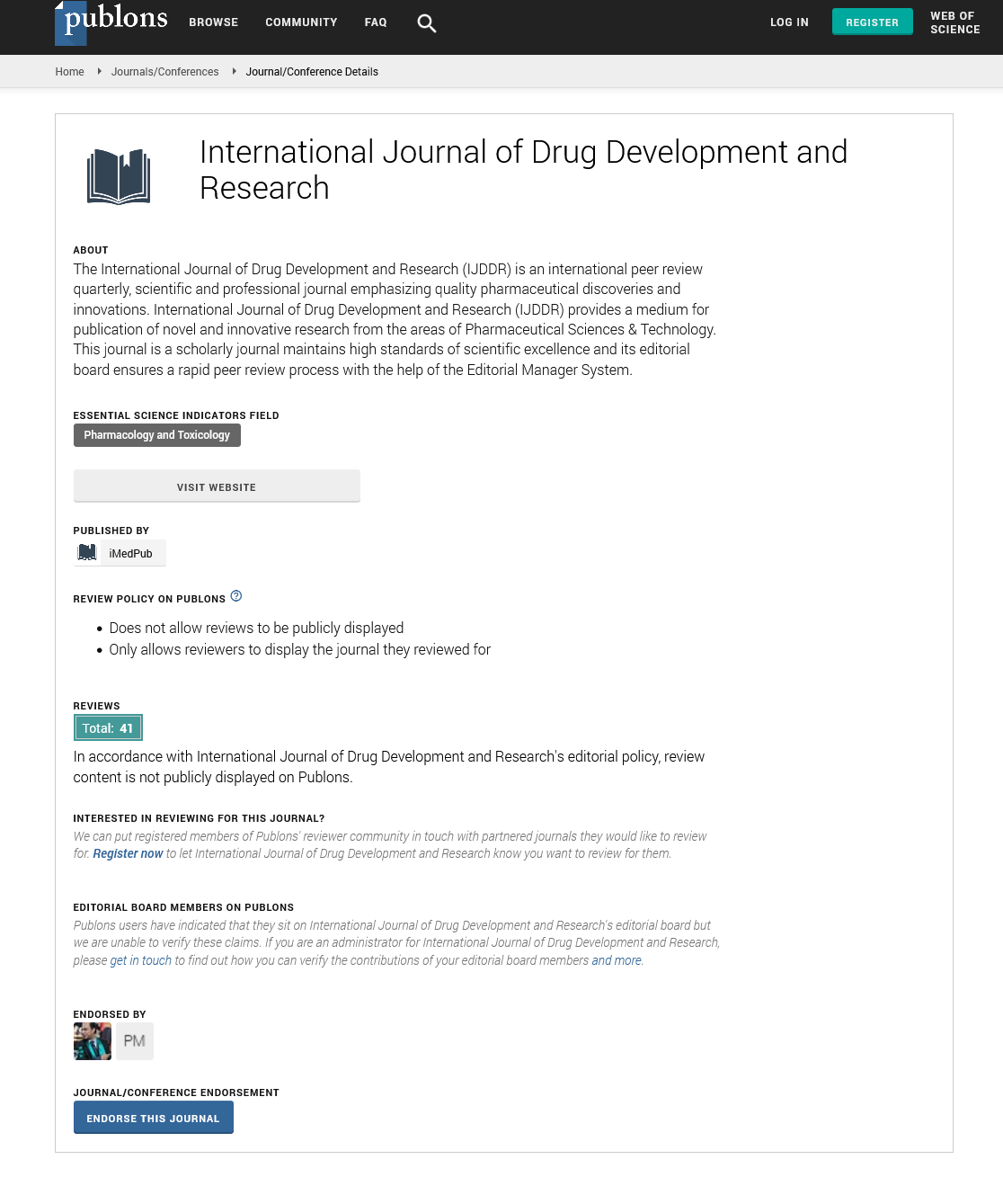Opinion - (2023) Volume 15, Issue 6
Embracing nature's wisdom: Herbal treatments for psoriasis
Bowan Lee*
Department of Pharmacognosy, University of Alberta, Edmonton, Canada
*Correspondence:
Bowan Lee, Department of Pharmacognosy, University of Alberta, Edmonton,
Canada,
Email:
Received: 01-Nov-2023, Manuscript No. ijddr-23-14318;
Editor assigned: 03-Nov-2023, Pre QC No. P-14318;
Reviewed: 17-Nov-2023, QC No. Q-14318;
Revised: 24-Nov-2023, Manuscript No. R-14318;
Published:
04-Dec-2023
Introduction
Psoriasis is a chronic autoimmune skin condition that
affects millions of people worldwide. Characterized by red,
inflamed patches covered with silvery scales, psoriasis can
cause discomfort, embarrassment, and a significant impact
on the quality of life for those who suffer from it. While
conventional medical treatments are available, an increasing
number of individuals are turning to herbal remedies
to manage their psoriasis symptoms. In this article, we
will explore the world of herbal treatments for psoriasis,
examining the potential benefits and considerations
associated with incorporating these natural remedies into a
holistic approach to managing the condition.
Description
Understanding psoriasis
Before delving into herbal treatments, it is essential to
understand the underlying causes and triggers of psoriasis.
The condition occurs when the immune system mistakenly
attacks healthy skin cells, leading to the rapid production of
new skin cells. This accelerated cell turnover results in the
characteristic red, scaly patches associated with psoriasis.
Genetic factors, environmental triggers, and immune
system dysfunction all play roles in the development and
exacerbation of psoriasis.
Herbal treatments for psoriasis
Aloe vera: Aloe vera, known for its soothing properties, has
been used for centuries to treat various skin conditions,
including psoriasis. Its anti-inflammatory effects may help
reduce redness and scaling associated with psoriatic lesions.
Applying Aloe vera gel directly to affected areas can provide
relief, and some individuals find success in using creams or
ointments containing Aloe vera.
Turmeric: Curcumin, the active compound in turmeric,
possesses potent anti-inflammatory and antioxidant
properties. Studies suggest that turmeric may help manage
psoriasis symptoms by reducing inflammation and slowing
down the excessive growth of skin cells. While it can be
consumed as a dietary supplement, applying a turmeric
paste topically may also provide relief.
Oregon grape: Oregon grape, a plant native to North
America, contains berberine, a compound with antimicrobial
and anti-inflammatory properties. Some herbal practitioners recommend creams or ointments containing oregon grape
extract for topical use on psoriatic lesions. However, it's
important to consult with a healthcare professional before
using herbal remedies to ensure safety and effectiveness.
Tea tree oil: Tea tree oil, derived from the leaves of the tea
tree (Melaleuca alternifolia), is known for its antimicrobial
and anti-inflammatory properties. While research on its
efficacy for psoriasis is limited, some individuals report
relief from symptoms when applying diluted tea tree oil
topically. It's crucial to be cautious with concentration, as
undiluted tea tree oil may cause skin irritation.
Mahonia aquifolium (Oregon grape holly): The extract
from the bark of Mahonia aquifolium, also known as
Oregon grape holly, has shown promise in managing
psoriasis symptoms. Studies suggest that it may help reduce
inflammation and slow down the excessive growth of skin
cells. Creams containing Mahonia aquifolium extract are
available, and some individuals find relief from regular
application.
Considerations and precautions
While herbal treatments offer a more natural approach to
managing psoriasis, it's important to approach them with
caution and under the guidance of a healthcare professional.
Here are some considerations and precautions.
Consultation with healthcare provider
Before incorporating herbal remedies into a psoriasis
treatment plan, individuals should consult with their
healthcare providers. This is especially crucial if they
are already using prescription medications to manage
their condition, as herbal remedies may interact with
conventional treatments.
Patch testing
Patch testing is essential when using herbal remedies
topically to ensure that individuals do not have adverse
reactions or allergies. Applying a small amount of the
herbal preparation to a small area of skin and monitoring
for any adverse effects can help prevent exacerbation of
psoriasis symptoms.
Quality of herbal products
The quality of herbal products can vary significantly. It
is advisable to purchase herbal supplements and topical
preparations from reputable sources to ensure potency,
purity, and safety. Certification from regulatory bodies can
be an indicator of product quality.
Potential interactions
Some herbs may interact with medications or other medical
conditions. For example, turmeric may have blood-thinning
properties, and individuals taking anticoagulant
medications should exercise caution. It is essential to
disclose all herbal treatments to healthcare providers to
prevent potential adverse interactions.
Conclusion
Herbal treatments for psoriasis offer a holistic and natural
approach to managing symptoms, providing an alternative
or complementary option to conventional medical
treatments. While some individuals report success with
herbal remedies, it's crucial to approach them with caution,
under the guidance of healthcare professionals. The diverse
array of herbs discussed in this article highlights the
potential richness of nature's pharmacy in addressing the
complexities of psoriasis. As research in this field continues,
a better understanding of the efficacy and safety of herbal
treatments for psoriasis may emerge, offering hope to those
seeking holistic approaches to managing this chronic skin
condition.






